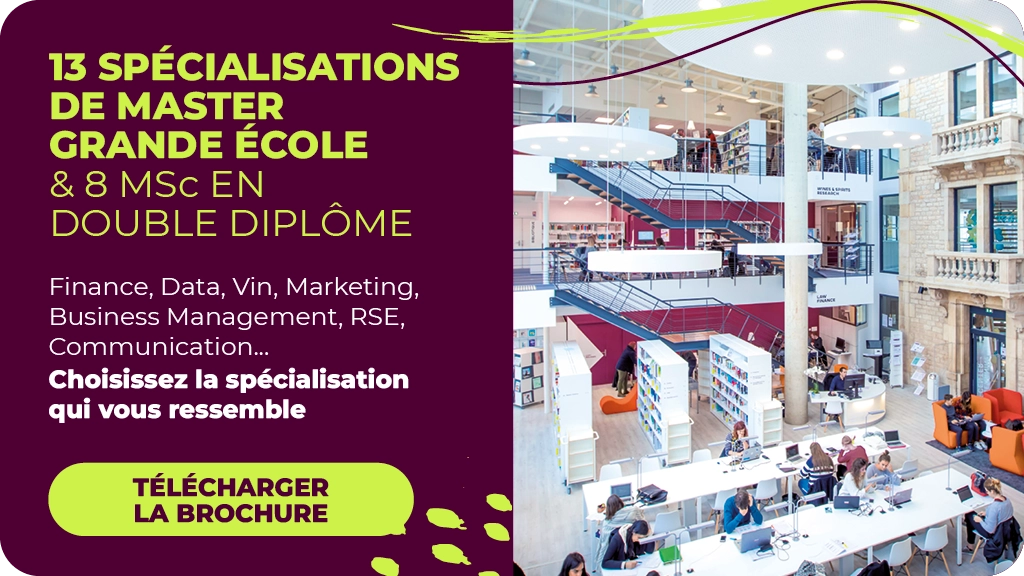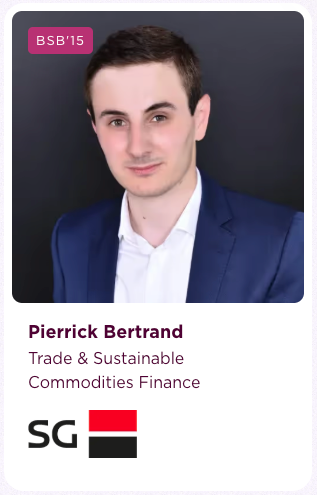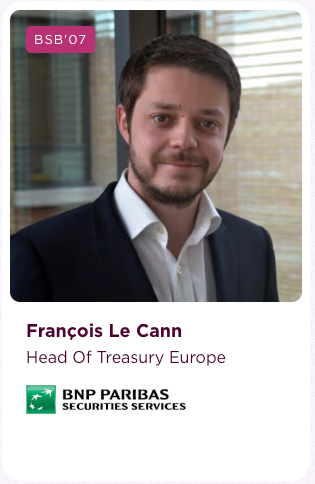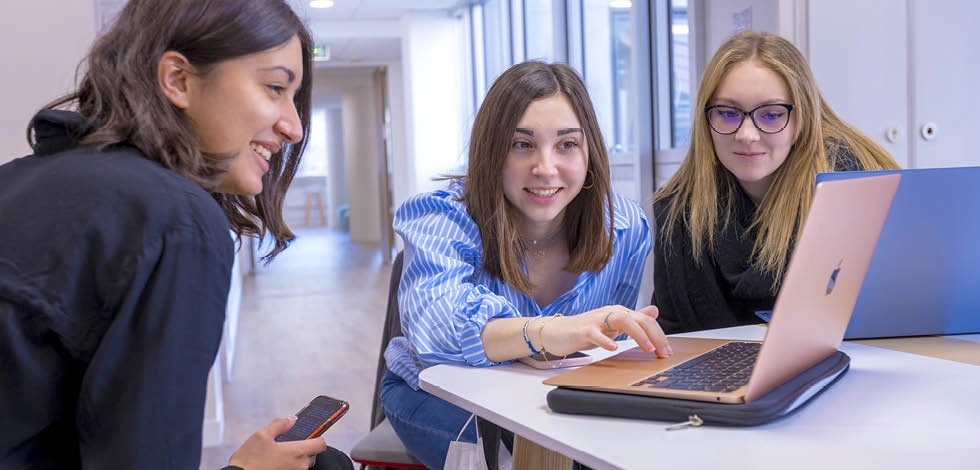How do I become a banker ? The complete guide to joining the banking sector

NB: For reasons of readability and fluidity of the text, we use the term “banker” in this article. This name obviously includes the functions of banker. At BSB, we believe in equal talent and opportunities, regardless of gender, background, or identity.
How do I become a banker? In 2024, 12% of job offers framework concerned the finance, accounting and management function (source: Apec). Proof that the banking sector is a major pillar of the job market. Behind the title of banker are several professions: retail banker, investment banker, consultant in banking and insurance, wealth manager. And they all support individuals or businesses in their financial projects, from day-to-day management to strategic investment.
Becoming a banker requires Banking and finance studies with the possibility of learning in the field thanks to thealternation. You are aiming for a recognized diploma in the banking world as a Bachelor Or a Master to build a rangelands ambitious? Your success will depend on choosing your school and developing skills : control of financial products, risk analysis, customer relationships. Today, these jobs are evolving rapidly with the rise of Big data, of theartificial intelligence and approaches related to CSR strategy, which are redefining the role of the banker and directly influencing his career and remuneration prospects.
What does being a banker consist of?
The main missions of the banker
The role of the banker is more than opening an account or granting a loan. In his daily life, he supports his clients (individuals and businesses) at each stage of their financial life. This includes:
- Analyze needs and propose appropriate solutions (loans, investments, insurance);
- Secure transactions and prevent risks;
- Manage client portfolios and develop relationships of trust;
- Participate in more complex financing projects, such as setting up a business or acquiring assets.

These missions rely on digital and analytical tools, which make it possible to anticipate financial behavior and to personalize advice.
📌 At BSB, students practice through practical cases inspired by real situations and gain access to Bloomberg trading room, a unique environment that reproduces the conditions of a real trading room.
The skills to excel in this job
Becoming a banker requires a solid technical foundation in banking and finance : market understanding, risk management, taxation, banking products. In addition, there are skills that are increasingly in demand:
- Data analysis and big data, to exploit ever larger volumes of information;
- Artificial intelligence, used to model risks or automate certain operations;
- Knowledge of ethical regulations and standards, essential in a highly regulated sector;
- Foreign language proficiency, to evolve in an international banking environment.
📌 At BSB, these skills are developed in concrete projects and thanks toalternation. Specialization Banking & Financial Engineering also includes preparing and passing the AMF certification, which is mandatory to hold certain positions in the banking network.
Expected personal qualities
While technical knowledge is essential, it is not enough. The banking profession also requires human qualities:
- Sense of contact and empathy, to create a relationship of trust with customers;
- Rigor and discretion, guaranteeing the safety of operations;
- Ability to handle pressure, in particular in the face of significant financial challenges;
- Critical thinking and long-term vision, because the credibility of the banker is based on his reliability.

📌 These qualities are worked on during training. At BSB, they are developing in particular thanks to the Leaderskills Institute, which offers scenarios, collective projects and dedicated workshops to strengthen both self-confidence and leadership.
What studies to become a banker?
To succeed in the role of banker, you must be able to combine technical and relational skills. Several options are available to you as soon as you obtain your bachelor's degree. The choice of a course will determine the solidity of your career and the speed of your professional integration.
Possible courses after the bac
After high school, entering a business school is the ideal path for banking and finance. At BSB, the Bachelor in Management offers a solid base to start in this sector and prepare for the rest of the journey.
For three years, you build a versatile base in management, economics, law and strategy, while progressively exploring Finance specialization in 3rd year. This course, taught 50% French and 50% English, immerses you in key subjects:
- International Finance (english),
- Financial Mathematics and Theory (English),
- Banks and Businesses (French),
- Financial reporting (French).
You develop sought-after technical skills and linguistic agility that prepare you both to work in France and internationally.
The Bachelor in Management also offers real opportunities for openness:
- One international experience from the 1st year with intensive English internship, exchange semester or even double degree in one of our 200 partner universities;
- Of professional experiences, from discovery courses to humanitarian missions, up toAlternating in banking in the 3rd year;
- One unique support system with Pathfinder™, which helps you build a clear and coherent professional project.
Other routes are possible or even the BTS Bank, BUT GEA and some university licenses in economics and management. These courses allow you to quickly enter the job market, but they often remain limited in terms of international openness and implementation. Choose one Business school suchlike BSBmeans choosing a stimulating environment, an active network of alumni and a state-recognized bachelor's degree diploma.
One Bachelor of Finance is generally a Bac+3 diploma recognized by the State, giving access to mainly operational positions. But depending on the school, the quality of education, the link with businesses, and the pathways to further education may vary.

📌 BSB is one of the few triple-accredited Grandes Écoles de Management (AACSB, EQUIS, AMBA), a label owned by less than 1% of business schools in the world. Its Bachelor in Management, approved by the State and enrolled in the RNCP (level 6), confers the License grade and guarantees academic and professional recognition in France and internationally.
Long studies: the Bac+5 course in business school
A Bac+2/+3 prepares mainly for operational missions. To progress to strategic positions in the banking sector, it is often necessary to continue until Bac+5. The Bachelor in Management acts as a natural springboard to Master Grande École specialization in banking and financial engineering with or without a double degree in the 2nd year of the master MSc Corporate Finance & Investment Banking, each career path that opens the way to high-level responsibilities.
Continue with the Grande École Master
The Master Grande École from BSB is a Bac+5 diploma which confers the Master's degree. This is a higher level of recognition than a simple RNCP registration, which attests to the academic excellence of the program and gives it strong credibility with employers in France and abroad.
This course is accessible after a Bac+3/+4 and offers great flexibility:
- Formats to choose from : initial or alternation from Master 1, or even over the two years, to combine academic expertise and business experience.
- Pre-Master : accessible after a Bac+2 or Bac+3, it allows you to upgrade in finance, management or English to start with all the keys.
- International openness : semester or internship abroad, 100% English-speaking track, intensive English course before the start of the school year.
3 Finance specializations allow you to target your ambitions:
- Audit Expertise Advice : possible alternation, preparation for 5 UE of the DSCG, for those who aim for accounting expertise or financial advice.
- Banking & Financial Engineering : focused on banking, wealth management and AMF certification.
- Corporate Finance & Control : for management control, cash management or financial consulting, with Power BI certification.
You benefit from tailor-made support with the device Pathfinder™, the development of your soft skills thanks to Leaderskills Institute, and a rich professional environment: expert conferences, more than 1,500 partner companies, a solid alumni network. Not to mention access to the Bloomberg trading room And the partnerships with PwC Luxembourg, which connect you directly to international finance standards.

Get a double degree with the MSc Corporate Finance & Investment Banking
For those who want to specialize even more, the MSc Corporate Finance & Investment Banking from BSB is a high level training program that is entirely internationally oriented. This program is available as a Master Grande École in 2E year. 100% in English, it prepares students for the most demanding jobs in the banking sector: investment banking, mergers and acquisitions, private equity, asset management.
The MSc is distinguished by:
- Teaching in English, as close as possible to international practices;
- Advanced courses in Financial Modeling, Valuation, Risk Management and Investment Banking;
- An immersive pedagogy, with the intensive use of financial databases (Bloomberg, Refinitiv);
- A strong professional base, thanks to applied projects and direct links with companies in the sector.
By choosing this MSc, you are positioning yourself in positions of high added value and with a global dimension, where dual technical and cultural competence makes all the difference.
Salary and career development in banking
Working in banking means working in an attractive sector where remuneration increases rapidly with experience and the level of qualification.
Average earnings
At the beginning of a career, a retail banker earns on average 28,000 to 35,000€ gross per year, while a financial analyst Or a junior investment banker can reach 45,000 to 60,000€, often supplemented by bonuses. Bac + 5 graduates from business schools generally access higher salary ranges as soon as they are hired.
Career development
After a few years, the prospects are numerous: branch manager, corporate client manager, investment bank account manager or even private banker. Mobility is also possible to audit, consulting or corporate finance.
At BSB, this growth is supported by personalized support. (Pathfinder™, Leaderskills Institute) and a solid network of more than 1,500 partner companies and alumni, which accelerate the employability of graduates.
Our Alumni in the banking sector



FAQ - Your frequently asked questions about being a banker
1. Do you need a Bac+5 to become a banker?
A Bac+3 is enough to start in banking, especially as a customer advisor. But to access more strategic positions, such as financial analyst or investment banker, a Bac+5 is highly recommended.
2. How to choose between a business school education and a university degree?
A bachelor's degree provides solid theoretical foundations, but is often less professional. A business school like BSB offers work-study programs, international opportunities and career support with partner banks that accelerate integration and development.
3. What is the average salary for a junior banker?
A novice banker earns on average between €28,000 and €35,000 gross per year. In investment banking, remuneration can exceed €40,000, with significant bonuses from the first years.
4. How to specialize in investment banking?
It is advisable to continue until Bac+5 in a finance specialization, such as the Master Grande École or the MSc Corporate Finance & Investment Banking from BSB. These courses provide the necessary technical skills and international openness.
5. What is the difference between a banker and a banking and insurance advisor?
Retail bankers assist individuals and small businesses in managing their accounts and credits. The banking and insurance advisor combines this mission with the sale of insurance products (health, pension, home).
6. Can you become a banker through apprenticeship?
Yes, many banking positions are available on an alternating basis from Bac+3. At BSB, the Finance specialization of the Bachelor in Management or the Master Grande École allow you to combine studies and business experience.
7. What are the other opportunities after a Master in Finance at BSB?
In addition to banker positions, graduates can progress to audit, consulting, corporate finance or even wealth management. Sectors in full transformation where dual technical and human skills are highly sought after.
*Sources: Apec





To remember